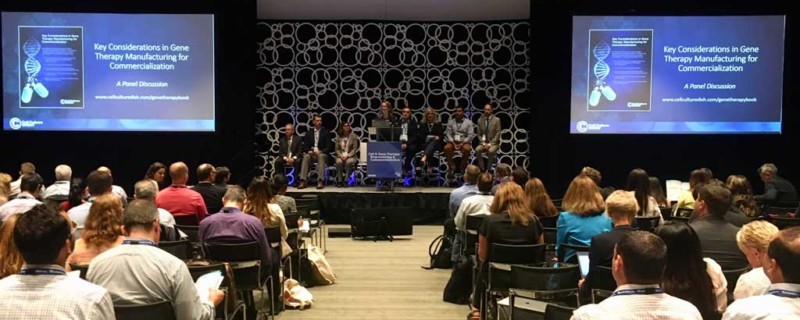
Key Considerations in Gene Therapy Manufacturing for Commercialization – A panel discussion
Podcast: Download (Duration: 33:27 — 46.0MB)
Subscribe Here: Apple Podcasts | Spotify | RSS | More
Subscribe to the Cell Culture Dish Podcast on: iTunes | Google Play
Hosted by: Brandy Sargent
Guests:
Company: PALL Corporation
Job Title: Senior Global Marketing Manager, Cell & Gene Therapy
Company: Adverum Biotechnologies
Job Title: Executive Director of the Process Development & Manufacturing Group
Specific topics discussed included:
- Planning for scale up, technology transfer and regulatory considerations on the way to commercialization.
- In-house vs. Outsourcing manufacturing.
- Ensuring scalability and efficient timelines in manufacturing while still maintaining reasonable cost.
- Incorporating the right analytics in gene therapy manufacturing
- Where are we at as an industry and where is there room for improvement.
Panel Members:
Brandy Sargent, Editor in-Chief, Cell Culture Dish and Downstream Column (Moderator)
Clive Glover, PhD, Senior Global Marketing Manager, Cell & Gene Therapy at PALL Biotech
Pratik Jaluria, PhD, Executive Director of the Process Development & Manufacturing Group at Adverum Biotechnologies
Tracy L. TreDenick, Head of Quality & Regulatory at BioTechLogic, Inc.
Joseph V. Hughes, PhD, Chief Scientist, VP Process & Analytical Development at WuXi Biologics
Nina Forsberg – Marketing Director, Vironova, Sweden
Ross Verheul – Senior Application Scientist, Beckman Coulter Life Sciences, USA
John Madsen, PhD, Head of PD Operations at FUJIFILM Diosynth Biotechnologies
Show Notes
We began the panel discussion with a question on where panelists saw key opportunities for improvements in gene therapy manufacturing. Answers from panelists included the creation of stable cell lines, better in-process analytics, improved purity monitoring and process understanding around critical quality attributes, and the need for a platform manufacturing system, particularly in downstream.
Next there was a discussion about how to improve cost of goods and how much of an issue it is for the industry. Panel members explained that for most, cost of goods is not as important in Phase I, but becomes a much larger issue in Phase II and beyond. Moving into bioreactors can move the cost down as well as better process understanding, single-use, closed systems, and an end to end platform process were all mentioned.
Dr. Jaluria pointed out that education is important when discussing cost and pricing because gene therapy treatments are not a chronic treatment, they are meant to cure and reverse disease progression. When looked at in those terms, the cost of gene therapies are more understandable. An audience member then asked if there had been a study in which chronic treatments were compared to gene therapy costs. Dr. Glover mentioned a study where they looked at the cost of treating hemophilia which can range from $350-500 thousand dollars per year. If a gene therapy for hemophilia was introduced that could cure the disease at a cost of one million dollars, then you could see that just 2-3 years of chronic treatment would cover the cost of one gene therapy treatment.
Lastly the panel answered the question if they had any advice for gene therapy companies entering clinical manufacturing. Key thoughts included deciding quickly how much improvement you want to make to your process and how much time you have to commit to process development, investing in a platform process, and anticipating your scale early to be sure you have the right technology to meet those scale demands as early as possible. For analytics, developing critical assays like potency and gene expression early as well as understanding the critical quality parameters up front. Ms. TreDenick discussed the advantages of creating a material utilization and prioritization plan to understand and plan for clinical material that will be needed. Dr. Jaluria discussed the importance of starting a network to include others in your company and also outside partners that you work with be it CMOs, suppliers or consultants, to draw on for support.